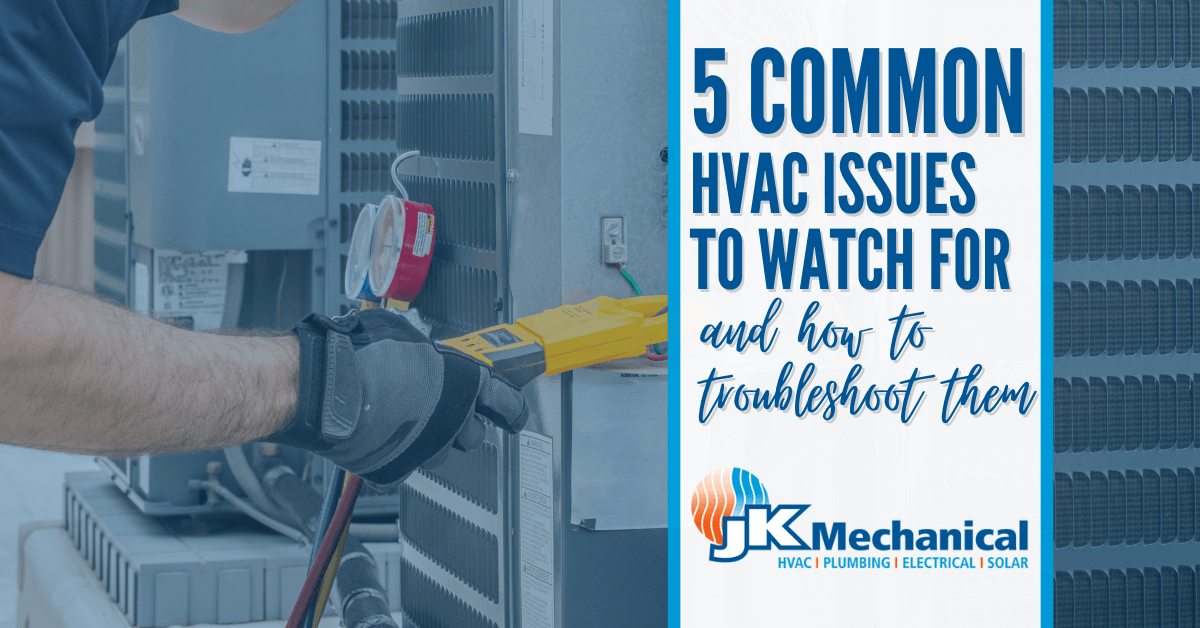5 Common HVAC Problems to Watch For
How your HVAC system is working (or not working) can make a huge difference in your day-to-day life. And while there is never a good time for your system to break down, your JK Mechanical technician can help avoid inconvenient and costly emergency repairs by providing regular maintenance, and by keeping an eye out for small issues before they grow into larger and more costly repairs. In today’s blog post, we’ll discuss five common HVAC problems you should be aware of, how to troubleshoot on your own, and when to call a professional for assistance:
Thermostat Issues
Your thermostat is Mission Control for your home comfort, which means it’s one of the first things we check when something goes wrong. Thermostat issues can include electrical issues such as a bad wire or battery, bad sensors, insufficient airflow, or simply improper programming. As a starting point, make sure:
- Your thermostat is lighting up/responsive to input
- The thermostat and sensors are not obstructed by furniture, wall hangings, curtains, or other decorations
- There are no potential electrical issues, such as a tripped breaker
If your thermostat is battery-powered and not turning on at all, you can change the batteries yourself by powering down your unit at the system and following the instructions in your user’s manual. If that doesn’t fix the issue or you’re not confident in the process, give JK Mechanical a call for assistance.
Dirty Air Filters
A dirty air filter isn’t just gross to look at: when your filter is clogged with dirt and debris, it can restrict airflow and cause your system to work harder than necessary. This can lead to higher energy bills, increased wear and tear on your system, and even a complete unit breakdown on hot summer days. (Have you seen pictures of iced-up outdoor units on boiling summer days? That’s often caused by dirty air filters!) Prevent inconvenient repairs by changing your standard 1” filter every 1-3 months and larger filters every 3-6 months, depending on your home’s needs. (Not sure how or how often? Talk to your JK technician at your next Precision Tune-Up, and they will be happy to show you the process!)
Refrigerant Leaks
Refrigerant is an important part of the cooling process in your air conditioner. Refrigerant is a chemical substance that absorbs environmental heat, and during the compression process can expel excess heat outdoors and cool the air being pushed by a fan through your ductwork. Over the years, wear and tear on system components can lead to refrigerant leaks, which in time will cause a lack of cooling and can even cause damage to your compressor. If you notice a refrigerant leak, we recommend calling a professional as soon as possible to prevent more extensive damage and expensive refrigerant loss.
Clogged Condensate Drain Line
The condensate drain line is responsible for removing moisture from your HVAC system. If it becomes clogged with dirt and debris, it can cause water to back up, potentially damaging your system and definitely causing a mess. To prevent clogs, schedule regular professional maintenance on your HVAC system. If you would prefer to clean it yourself between maintenance visits, make sure to stay safe and power the system off before performing maintenance tasks.
Unpleasant Odor
An unpleasant odor coming from your HVAC system can have a wide variety of causes, depending on the type of smell. Some odors, like a dusty or singed smell the first day you run your heating in the fall, can simply be dust burning off after months of disuse and are generally harmless. Other smells, however, can be a sign of a much more significant or dangerous issue. A gas or rotten egg smell, for example, could be caused by a dangerous gas leak, and should be treated as an emergency. A singed or “electrical” smell can be a sign of a serious wiring or combustion problem, and for safety should also be treated as an emergency. A mold or mildew smell, on the other hand, is generally not an emergency, but can still be a sign of poor indoor air quality that will affect your health over time and should be seriously evaluated. Either way, it’s important to:
- Keep your smoke and CO detectors in good working condition
- Schedule regular HVAC maintenance
- Maintain balanced indoor humidity
- Call a JK technician or fuel professional for assistance if you’re not able to identify and rectify the source of a funny smell.
Understanding common HVAC problems can help you identify issues with your system, take steps to prevent them, and stay in control of your home comfort. If you’re experiencing any of these issues or have concerns about keeping your HVAC system running smoothly all year long, turn to the experts at JK Mechanical and contact us today.



